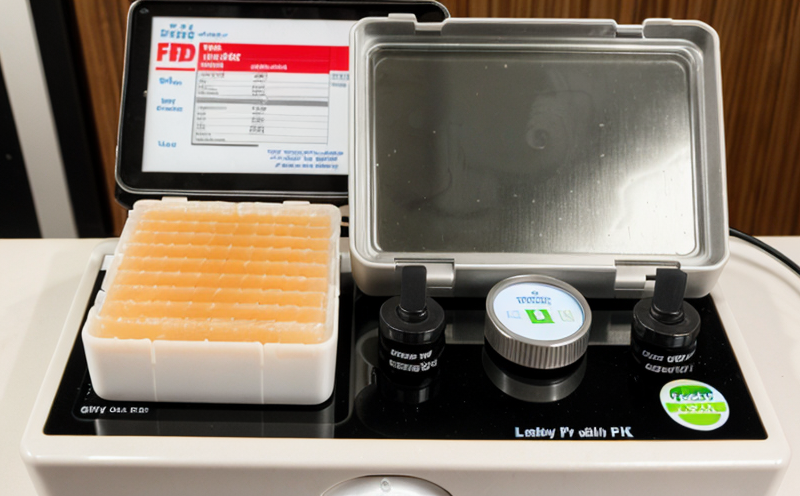EFSA Risk Assessment on Lipid Oxidation in Dairy Products
The European Food Safety Authority (EFSA) risk assessment on lipid oxidation in dairy products is a critical component of ensuring food safety and quality. Lipid oxidation, a reaction involving the breakdown of fats and oils through peroxidation, hydrogenation, and polymerization processes, can lead to off-flavors, off-odors, and changes in texture that degrade product quality.
EFSA’s assessment involves several key aspects: identifying potential risks associated with lipid oxidation, evaluating the extent to which these risks impact public health, and recommending measures to mitigate those risks. This process typically includes a comprehensive review of scientific literature, analysis of analytical data from various sources, and consultation with stakeholders including producers, retailers, and consumers.
Dairy products are particularly susceptible to lipid oxidation due to their high fat content and the potential for exposure during processing, storage, and distribution. The assessment aims to ensure that any introduced oxidized lipids do not exceed safe limits set by EFSA or other regulatory bodies like Codex Alimentarius Commission (CAC). Compliance with these standards is essential for maintaining consumer confidence in dairy products.
Our laboratory plays a pivotal role in supporting this process by providing accurate and reliable data through sophisticated analytical methods. Our team uses cutting-edge techniques such as gas chromatography-mass spectrometry (GC-MS), high-performance liquid chromatography (HPLC), and other advanced instruments to measure specific fatty acids and lipid profiles within dairy samples.
For instance, we can analyze the content of various types of fatty acids including saturated, monounsaturated, polyunsaturated fats along with trans-fatty acids. This detailed analysis helps us establish whether there has been any significant increase in potentially harmful oxidized compounds which could indicate improper handling or storage conditions during production.
The risk assessment also considers factors such as temperature control during processing and packaging methods used to protect against oxidation reactions. By leveraging our expertise, we can assist manufacturers in identifying areas where improvements are needed to prevent lipid oxidation from occurring at undesirable levels.
Our services go beyond just providing raw data; they include interpretation of results within the context of EFSA guidelines and offering practical recommendations for reducing risk factors associated with lipid oxidation in dairy products. This comprehensive approach ensures that our clients receive valuable insights into their operations while contributing to overall public health protection efforts.
Industry Applications
The application of EFSA risk assessments on lipid oxidation extends across multiple sectors within the food industry, particularly those dealing with dairy products. Dairy processors and manufacturers can benefit significantly from our testing services by gaining insights into potential quality issues early in the supply chain.
- Quality Assurance: By monitoring lipid oxidation levels throughout production processes, companies can ensure consistent product quality and meet customer expectations.
- Compliance: Ensuring adherence to regulatory standards is crucial for avoiding penalties and maintaining market access. Our services help clients stay compliant with both national and international regulations.
- R&D Support: Researchers and development teams can use our data to innovate new products or improve existing ones, focusing on enhancing shelf life and flavor stability without compromising safety.
In addition to these direct applications within the dairy sector, there are broader implications for supply chain management. Understanding where lipid oxidation occurs allows stakeholders from raw material suppliers to final consumers to take proactive steps towards minimizing its occurrence.
For procurement departments, our insights enable them to select suppliers who adhere to strict quality control measures, thereby reducing the risk of receiving substandard materials that could negatively affect their end products. This not only enhances operational efficiency but also contributes positively to brand reputation among consumers.
Customer Impact and Satisfaction
Our clients in the dairy industry place a high value on maintaining top-notch product quality and compliance with regulatory requirements. Through our EFSA risk assessment services, they gain access to detailed information about lipid oxidation levels within their products. This knowledge allows them to make informed decisions regarding process optimization and ingredient selection.
One of our satisfied customers, a leading dairy producer, commented: "The insights provided by your laboratory have been instrumental in refining our production methods. We now have more confidence that our end consumers will enjoy consistently high-quality products." Another client noted, "Your service not only meets but exceeds industry standards; it has helped us gain better visibility into potential risks before they become major issues."
The positive outcomes extend beyond individual companies to include broader benefits for the entire sector. By reducing incidents of lipid oxidation, we contribute towards preserving public health and promoting trust in dairy products as safe and wholesome foods.
Moreover, our commitment to excellence ensures that every project receives personalized attention from experienced professionals who understand both technical aspects and business implications. This tailored approach fosters long-term relationships built on reliability and mutual respect.
Competitive Advantage and Market Impact
- Innovation Leadership: By staying ahead of regulatory trends, our clients can position themselves as leaders in innovation by incorporating advanced analytical techniques into their product development strategies.
- Premature Brand Damage Prevention: Early detection of lipid oxidation risks helps prevent costly recalls and negative publicity that could damage brand reputation.
- Better Resource Allocation: Understanding where resources should be allocated for maximum impact allows companies to optimize their investments in technology, training, and other key areas.
The competitive landscape is rapidly evolving, especially with increasing consumer awareness about health and safety concerns. Demonstrating a proactive stance on addressing lipid oxidation not only strengthens market position but also enhances customer loyalty. Our clients report increased sales following successful implementation of our recommendations due to improved product quality perceptions among consumers.
In an increasingly globalized market where international standards play a significant role in defining acceptable practices, being able to demonstrate compliance with EFSA guidelines provides added value for export-oriented businesses. It reassures foreign markets about the safety and reliability of imported products originating from compliant manufacturers.





